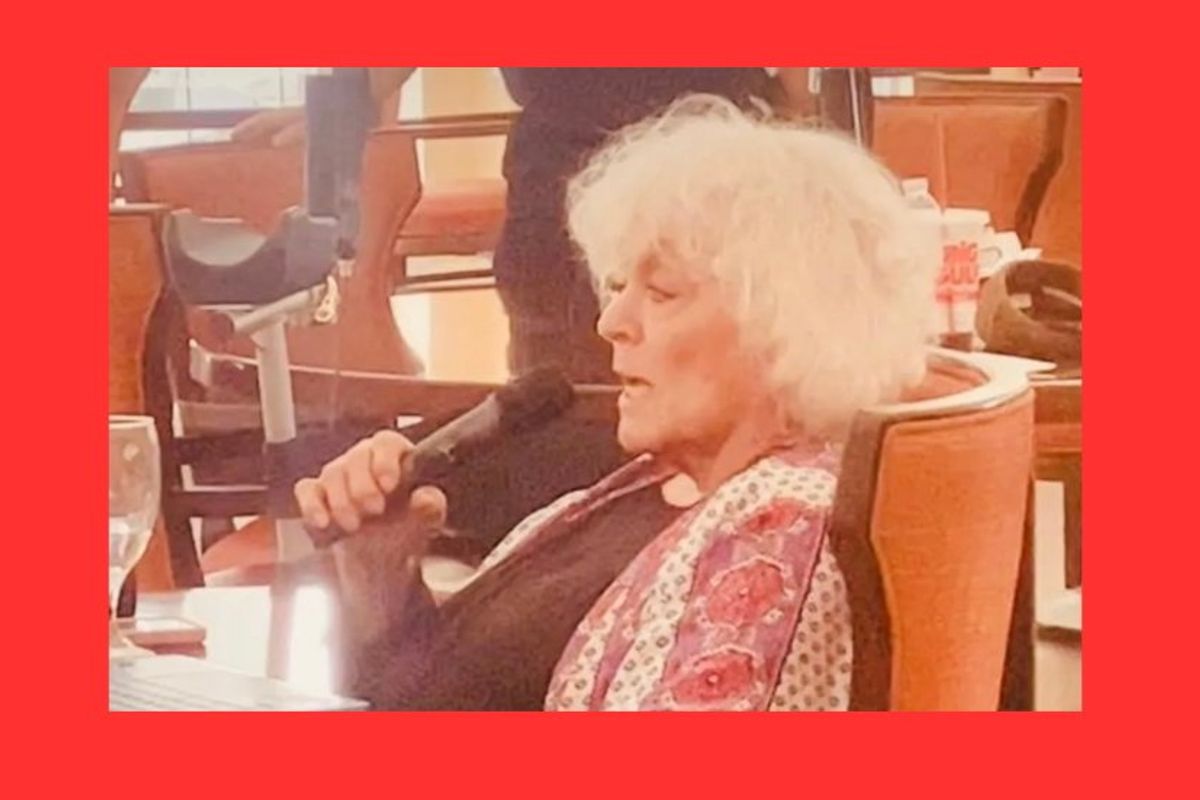85-year-old woman in senior home brings down the house with Fleetwood Mac 'Landslide' cover
There wasn't a dry eye in the house.
A woman sings "Landslide" by Fleetwood Mac at karaoke.
On a hot Sunday in July, Carole Wade took the mic at a Dallas senior living facility where my mom lives. I happened to be visiting for the karaoke event, and the list of residents who couldn't wait to put their stamps on their favorite tunes was so long, the event had to be extended. ABBA's "Mamma Mia," David Lee Roth's "Just a Gigolo"—you name it, they sang it.
When it was Wade's turn, the microphone was brought to her table. She took it in her hands as though it was an extension of her fingers as the music cued up. Then, as she began to effortlessly sing "Landslide" by Fleetwood Mac, the room got still. Frozen. All eyes were on her, and most of those eyes were wet. The lyrics, so beautifully fitting:
"Well, I've been afraid of changin'
'Cause I've built my life around you.
But time makes you bolder,
Even children get older,
I'm getting old too."
A man sitting at our table took notice of how emotional I had become. He leaned over to say, "Never stop feeling the music."
I had the honor of chatting with Wade, who at 85, has been singing nearly her whole life. She got started in the business as a backup singer in Elvis impersonator groups in Dallas and surrounding areas. In and out of bands, playing Deep Ellum clubs and local hotels, she shares, "I've been singing since I was a small child. I've loved music all my life."
As luck would have it, she was at a jam session when she started harmonizing with other musicians. They would soon form her most recent band, Psychedelic Oatmeal. They officially stopped playing gigs when she was in her 70s, but they remain close. (She notes her bandmates were all much younger.)

They covered classic rock tunes from Stevie Nicks, The Eagles, Janis Joplin, and Led Zeppelin. Songs like "Me and Bobby McGee," "Seven Bridges Road," and "Whole Lotta Love." She laughs that most of the men in the band couldn't hit those Zeppelin high notes made famous by Robert Plant, so she took on the challenge—with great success.
They even branded themselves at gigs, making little Ziploc bags of oatmeal and glitter, which they would throw to the audience at shows. That is, until a club owner asked them to stop, as the oatmeal was mixing with spilled drinks, "creating goo."
Rare footage of Psychedelics Oatmeal.
The band Psychedelic Oatmeal plays in Dallas. www.youtube.com
Wade makes clear that music is her therapy. "If you're down on a certain day, it will bring you up." She has lived a full life, with two grown sons who are both excelling in life. But music, and the friends with whom she makes it, brings her that extra piece of joy and purpose.
Michael Hatcher, the Resident Services Director at The Reserve at North Dallas (the senior facility in which this event was held), has seen firsthand how music soothes seniors. It reconnects them to their purest selves, no matter how hazy their memories might become. Hatcher shares, "They remember the music, and the time. It's a vessel for anyone of age. It can be used to bring someone out of the deepest sun-downing and back to life."
A man sings "Just a Gigolo" at The Reserve karaoke day.
@cdk213 Senior living karaoke! Fabulous! #seniorlivingcommunity #justagigalo #dallas
There is much research to support this. Bannerhealth.com quotes music therapy coordinator Tammy Reiver for Banner Hospice in Phoenix: "Music holds the power to increase dopamine levels (happy hormones), decrease symptoms of depression and pain, and improve a person’s quality of life. Pleasing music plays an important role at every age, but for aging adults, the benefits are even greater.”
As for Wade? She jokes that she and a few other musicians at the senior home have plans to start their own band. She certainly has the chops for it—and the fans.
- Senior citizens in Spain tap into their inner child with playground designed just for them ›
- Stevie Nicks delivers some brutal but honest advice to Katy Perry that we could all use ›
- The Cranberries' Dolores O'Riordan sang 'so very Irish' Fleetwood Mac cover people adore ›
- Singer in hospice soulfully performs 'Landslide' for 'one last time' - Upworthy ›
- 91-year-old couple who met at a senior home prove it's never too late to find love and marry - Upworthy ›
- "It's you who keep me going": 81-year-old writes heartfelt text to his softball teammates - Upworthy ›
- Man delights at senior home karaoke with a show-stopping rendition of 'Just a Gigolo' - Upworthy ›
- Elderly woman hilariously shares her 'not to do' list and it’s truly inspiring - Upworthy ›
- Two men in their 80s take a trip in a self-driving car, and it's an absolute must-watch - Upworthy ›
- The Cranberries' Dolores O'Riordan sang a 'so very Irish' Fleetwood Mac cover people adore - Upworthy ›
- 79-year-old man publicly sings Barry Manilow's 'Mandy' to his dental hygienist and nails it - Upworthy ›
- In a 1977 clip, Stevie Nicks and Christine McVie nail a sexist question about being 'pretty faces' - Upworthy ›
- Wilco's Jeff Tweedy surprises crowd by singing one of his band's most beloved songs at karaoke - Upworthy ›

